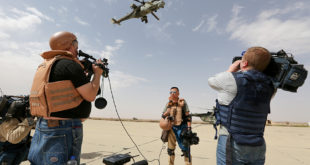Issue 30, summer/fall 2020 https://doi.org/10.70090/RASG29JM Abstract This paper examines the journalism and media education programs in three countries in the Arab region (Libya, Syria, Yemen) that have been or are still in the throes of civil wars and/or polarization along conflicting political ideologies and control of different geographical zones. Based …
Read More »Knowledge and Social Change: Impact of 40 Years of Health and Population Communication in Egypt
Issue 28, summer/fall 2019 https://doi.org/10.70090/FEK28KSC Abstract The main objective of this paper is to seek an answer to an important research question: Why did some communication campaigns on health and population issues in Egypt succeed, while others failed to make the desired impact on behavior and subsequent outcomes, such as …
Read More »The Creative Environment of Scientific Content Production on Social Networking Platforms (Arabic)
Issue 28, summer/fall 2019 https://doi.org/10.70090/ASH28CES Scroll down for the Arabic abstract. Social Networking platforms impose new methods of creating audiovisual content, through the use of new technologies; this has also altered the nature of content production and consumption. Social networking platforms represent an ostensibly free, advanced and low-cost space, allowing …
Read More »A Critical Analysis of the Dialectic Science-Religion Relationship in Popular Science Show Discourse
Issue 28, summer/fall 2019 https://doi.org/10.70090/EAR28CAD Abstract In light of the advancing digital environment and the interest in boosting scientific content published on digital platforms, this paper seeks to define and critically analyze the discourse of popular science shows (henceforth, “PSS”). Considering the fact that religion serves as a major foundational …
Read More »Transformations and Trends in Science Journalism as Viewed by the Egyptian Media and Scientific Community
Issue 28, summer/fall 2019 https://doi.org/10.70090/MME28TSJ Scroll down for the Arabic abstract. The study aims to identify the common perceptions and evaluation of the journalistic and scientific community in Egypt, of current transformations and trends in scientific journalism. The study does so, in order to determine the following: 1) The position …
Read More »More than Meets the Eye: A Multimodal Approach to Science-Popularizing Discourse and Representation of the ‘Other’ in a Selection of National Geographic Feature Articles
Issue 28, summer/fall 2019 https://doi.org/10.70090/NE28MMAS Abstract National Geographic Magazine (NGM) is an American cultural icon renowned for the dissemination of geographic knowledge, the exhilaration of cultural explorations, the popularization of science discourse, and the cultivation of visual imaginaries. Among popular science magazines, its distinctive force in the popular imagination squarely …
Read More »The Role of Egyptian Science YouTube Channels in Promoting Scientific Literacy- An analytical study based on Media Richness Theory (Arabic)
Issue 28, summer/fall 2019 https://doi.org/10.70090/SK28ESYT Scroll down for the Arabic abstract. Due to the rapid technological and scientific advances nowadays, the need to improve scientific literacy has become increasingly important for Arab citizens. YouTube is a Web 2.0 video-sharing platform, widely used by ordinary citizens-called “YouTubers”- to increase the public's …
Read More »Applying the Four Models of Science Journalism to the Publics’ Interaction with Coronavirus News
Issue 28, summer/fall 2019 https://doi.org/10.70090/LK28FMSJ Abstract Since the outbreak of coronavirus, also known as COVID-19, the news has been covering its rapid developments by the minute, while feeding the eager publics the information they seek regarding its origin, health-threats, symptoms, preventative measures, and global impact. It is thus of pressing …
Read More »Communicating Science in the New Media Environment: The Advancement of Science Literacy
Issue 28, summer/fall 2019 https://doi.org/10.70090/HES28CSN “Science literacy is the artery through which the solution of tomorrow’s problems will flow” - Neil deGrasse Tyson Abstract Science is the social foundation that encompasses all facets of life, from educating individuals, to allowing them to make informed decisions in their daily lives. Science …
Read More »Marathon TV Watching among Emiratis in the Interactive Media Environment
Issue 27, winter/spring 2019 https://doi.org/10.70090/AAAM27TV Abstract The study investigates the habits of binge TV watching—also called marathon TV watching—among a sample of Emiratis. It refers to watching consecutive episodes of a series in one setting for several hours. The research examines the expected outcomes for binge-watching and the possibilities of …
Read More » Arab Media & Society The Arab Media Hub
Arab Media & Society The Arab Media Hub










